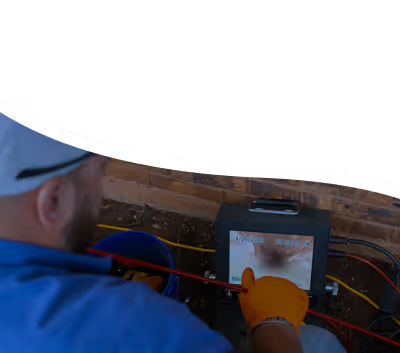Almost every home in America rests on a concrete foundation that elevates it and keeps it level. It is quite literally the bedrock on which your home is built. As you could imagine, damage to it leaves the integrity of your home compromised. So obviously you need to take any foundation issue seriously. That said, not every single hairline crack is an issue, as the foundation is usually the most sturdy part of the home. Certain types of cracks are more serious than others, and the causes for these fissures are easy to prevent when you know what you’re looking for.
Plumbing Leaks:
If you’ve been reading our blogs, hopefully you understand the severity of a plumbing leak. If not, this should be a severe enough issue to spur you to take leaks seriously. When your pipes stop working, be they water or sewer lines, the liquid erodes at your foundation which can and will cause damage over time. The longer your leak goes unchecked, the more severe the damage. Tree Roots: What’s out of sight should not be out of mind. Tree roots are a common culprit in damaging foundations. It usually comes as a result of trees planted after the home’s construction, though certain varieties of large, old trees are known to have roots expand far from the base of their trunks. Eventually, they creep out further and further and eventually into your foundation, causing cracks and fissures.
Poorly Thought Out Engineering/Additions:
Sometimes a house is just poorly constructed. Shoddy construction methods and cheap materials don’t stand the test of time and will eventually buckle and break. A slipshod job won’t surprise anyone if issues arise, but what most homeowners don't consider is that an addition can damage your foundation. And although it may not be your first thought when adding a level to your home, but it makes sense when you think about it: more levels on the home means more pressure on the foundation and more cracks in the concrete. Always consider the foundation when planning additions to your home.
Settling:
If your foundation settles, it could result in a crack, especially if the settlement is differential.Soil: The soil your home is built on can be a factor in your foundations' wellbeing. In soils with a clay content, especially a high clay content, heaving or lifting pressures of the soils may crack the foundation.
Call the professionals at Midway Plumbing!
Read Our Fantastic Reviews

Our Blog
Explore Our Latest Insights
Stay Updated with our expert articles and tips.

Why Choose Midway Plumbing?

Experience: Midway Plumbing has been serving the Abilene, TX area for more than four decades, establishing a strong reputation for reliable service.

Attention to Detail: Midway Plumbing hires only the most detail oriented plumbers to provide you with thorough, professional solutions.

24/7 Emergency Services: We offer round-the-clock emergency plumbing services to address urgent issues promptly.

Clean, Courteous & Honest Service: Our commitment to professionalism is evident in their customer interactions and service delivery.








